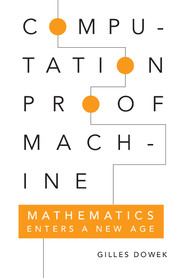Book contents
- Frontmatter
- Dedication
- Contents
- Introduction: In Which Mathematics Sets Out to Conquer New Territories
- PART ONE Ancient Origins
- PART TWO The Age of Reason
- 3 Predicate Logic
- 4 From the Decision Problem to Church's Theorem
- 5 Church's Thesis
- 6 Lambda Calculus, or an Attempt to Reinstate Computation in the Realm of Mathematics
- 7 Constructivity
- 8 Constructive Proofs and Algorithms
- Part Three Crisis of the Axiomatic Method
- Conclusion: As We Near the End of This Mathematical Voyage …
- Biographical Landmarks
- Bibliography
- References
7 - Constructivity
from PART TWO - The Age of Reason
Published online by Cambridge University Press: 05 May 2015
- Frontmatter
- Dedication
- Contents
- Introduction: In Which Mathematics Sets Out to Conquer New Territories
- PART ONE Ancient Origins
- PART TWO The Age of Reason
- 3 Predicate Logic
- 4 From the Decision Problem to Church's Theorem
- 5 Church's Thesis
- 6 Lambda Calculus, or an Attempt to Reinstate Computation in the Realm of Mathematics
- 7 Constructivity
- 8 Constructive Proofs and Algorithms
- Part Three Crisis of the Axiomatic Method
- Conclusion: As We Near the End of This Mathematical Voyage …
- Biographical Landmarks
- Bibliography
- References
Summary
whereas the theory of computability placed computation at the heart of several major mathematical issues, the theory of constructivity, which was developed independently, does not appear, at first glance, to assign such an essential role to computation. If you look closer, however, you will find that computation also plays an important part.
CONSTRUCTIVE VERSUS NONCONSTRUCTIVE ARGUMENTS
Let's start with a story. It takes place in Europe, shortly after World War I. The explorer has returned from his many travels and, now clean shaven and well rested, decides to ride the Orient Express from Paris to Constantinople. In his compartment, he finds an intriguing, scented note sent by a secret admirer: the mystery woman asks him to meet her on the platform of the last station the train calls at on French territory. The explorer gets hold of a list of the stations the Orient Express stops at from Paris to Constantinople: Strasbourg, Utopia, Munich, Vienna, Budapest,… He knows that Strasbourg is in France and that Munich is in Germany, but he has no idea where Utopia is. He asks his fellow passengers, he asks the conductor, but Utopia is such a small, obscure station that nobody on board the train is able to help him – it is hard to fathom why the Orient Express would even stop in a town no one seems ever to have heard of! Will the explorer manage to meet his lady? It's not a sure thing. Yet it is not hard to prove that there exists a station at which the Orient Express stops that is in France and is such that the next station is no longer in France. For either Utopia is in France, and then is the train's last stop there, or it is not, in which case Strasbourg is the train's last stop on French soil.
- Type
- Chapter
- Information
- Computation, Proof, MachineMathematics Enters a New Age, pp. 73 - 81Publisher: Cambridge University PressPrint publication year: 2015



